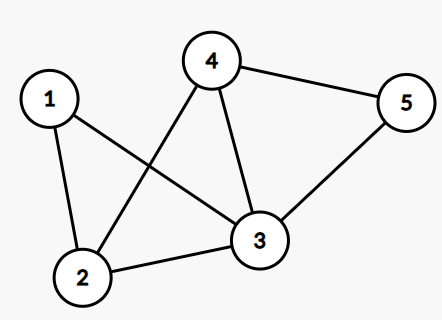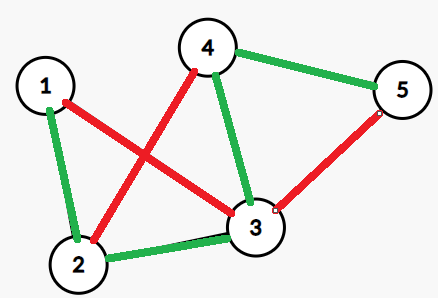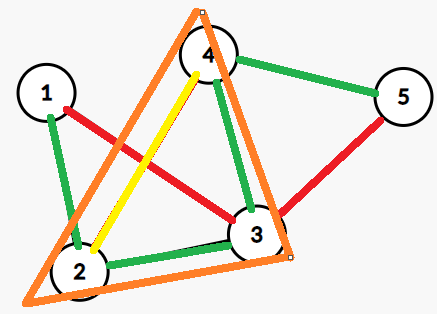【图论,数学 + 线性基】AcWing 228. 异或
分析
思路很有价值的一道题。
首先我们可以注意到,一种解的形式一定是一条 的路径以及若干个环(当然可以是 个)。
因此下面只需要证明两个结论:
- 一条 的路径(的异或值)一定能够被另一条 的路径以及若干个环拼凑出来。
- 任意一个能够被起点到达的环(的异或值)一定能被选取。
证明
- 对于第一个结论:可以发现如果 存在两条路径,那么这两条路径之间一定能形成一个环,那么我们一定能从一条路径 + 环异或得到另一条路径。
- 第二个结论比较明显,如果要选那个环,就从起点出发到那个环上绕一圈再回到起点即可。
有了上面两个结论,我们就能够保证这个做法的正确性:任意选取一条 的路径的异或值,然后将其异或上若干个环(下面说具体做法)并得到最优解(也就是所需要求的解)。
具体做法:
以下图为例:

我们从 出发做一遍 ,然后将第一次访问的到的点所对应的边记为树边,否则记为环边。
例如 访问的过程中经过点的顺序为 ,那么树边(绿色)和环边(红色)如下图所示:

当我们得到环边的时候,将相应的环加入一个集合 中,比如下图标出来的环边(黄色的边)对应的环(橙色标注)就是:

可以发现,这样能够保证所有环能够被直接或间接地异或得到,也就保证了正确性。(例如环 可以被 异或得到)
最后的任务是从集合 中选若干个以及任意一条初始路径进行异或使得答案最大,这里可以使用线性基来解决。
实现
// Problem: 异或
// Contest: AcWing
// URL: https://www.acwing.com/problem/content/230/
// Memory Limit: 64 MB
// Time Limit: 1000 ms
//
// Powered by CP Editor (https://cpeditor.org)
#include<bits/stdc++.h>
using namespace std;
#define debug(x) cerr << #x << ": " << (x) << endl
#define rep(i,a,b) for(int i=(a);i<=(b);i++)
#define dwn(i,a,b) for(int i=(a);i>=(b);i--)
#define pb push_back
#define all(x) (x).begin(), (x).end()
#define x first
#define y second
using pii = pair<int, int>;
using ll = long long;
#define int long long
inline void read(int &x){
int s=0; x=1;
char ch=getchar();
while(ch<'0' || ch>'9') {if(ch=='-')x=-1;ch=getchar();}
while(ch>='0' && ch<='9') s=(s<<3)+(s<<1)+ch-'0',ch=getchar();
x*=s;
}
const int N=1e5+5, M=N<<1;
struct Edge{
int to, w, next;
}e[M];
int h[N], tot;
void add(int u, int v, int w){
e[tot].to=v, e[tot].w=w, e[tot].next=h[u], h[u]=tot++;
}
int n, m;
vector<int> ring;
bool vis[N];
int d[N];
void dfs(int u){
vis[u]=1;
for(int i=h[u]; ~i; i=e[i].next){
int go=e[i].to;
if(!vis[go]) d[go]=d[u]^e[i].w, dfs(go);
else ring.pb(d[go]^d[u]^e[i].w);
}
}
signed main(){
memset(h, -1, sizeof h);
cin>>n>>m;
rep(i,1,m){
int u, v, w; read(u), read(v), read(w);
add(u, v, w), add(v, u, w);
}
dfs(1);
int res=d[n];
vector<int> b;
for(auto i: ring){
int val=i;
for(auto j: b) val=min(val, j^val);
if(val) b.pb(val);
}
for(auto i: b) res=max(res, res^i);
cout<<res<<endl;
return 0;
}



【推荐】国内首个AI IDE,深度理解中文开发场景,立即下载体验Trae
【推荐】编程新体验,更懂你的AI,立即体验豆包MarsCode编程助手
【推荐】抖音旗下AI助手豆包,你的智能百科全书,全免费不限次数
【推荐】轻量又高性能的 SSH 工具 IShell:AI 加持,快人一步
· 地球OL攻略 —— 某应届生求职总结
· 周边上新:园子的第一款马克杯温暖上架
· Open-Sora 2.0 重磅开源!
· 提示词工程——AI应用必不可少的技术
· .NET周刊【3月第1期 2025-03-02】
2021-02-14 【DP+贪心】能量石